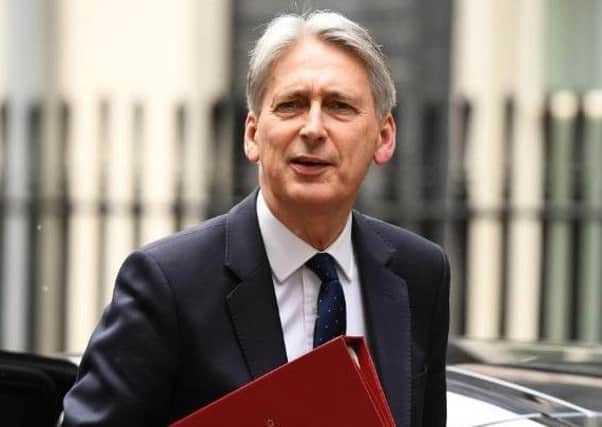Treasury lost credibility during Indyref 1, but we must heed its warnings now – Bill Jamieson


In space, no-one can hear you scream – such was the memorable one-liner from the sci-fi horror classic, Alien. Today, in the standing room-only cacophony that is the Tory leadership hustings, the screams of Chancellor Philip Hammond have never been louder – but no-one is listening.
Time was when a UK Chancellor was one of the most authoritative voices in government. Whether we agreed with the occupant of No 11 or not, the speeches and statements – from budgets to emergency measures to address a fiscal crisis – were at least listened to with some semblance of respect.
Advertisement
Hide AdAdvertisement
Hide AdBut who is listening to the Chancellor now? With almost every day the warnings of Philip Hammond against the ludicrous spending pledges of both contenders for the UK premiership, and the economic consequences of a ‘no deal’ Brexit have now become akin to a blood-curdling fiscal scream. But barely any attention is being paid.
Yet what he says surely matters. The two Tory leadership contenders have gone on an incredible binge of spending commitments. Jeremy Hunt says he will increase defence spending by £15 billion over the next five years, cut Corporation Tax to 12.5 per cent, raise the threshold for paying National Insurance, keep free TV licenses for the over-75s, build 1.5 million homes, and go ahead with. both HS2 and the third runway at Heathrow.
Boris Johnson plans to raise the 40p higher income tax threshold to £80,000 at an annual cost of £9 billion, has pledged more money for public sector workers, wants to increase the National Living Wage, will “find the money” to recruit an extra 20,000 police officers, provide full-fibre broadband in every home by 2025 and plans £4.6 billion for extra spending on education. All this – and a no-deal exit looking more likely than not on 31 October.
In the Commons this week, Hammond gave his most outspoken warning yet. A “disruptive” no-deal Brexit, he declared, could have a £90 billion “hit” on the Exchequer. And he suggested there will be “no money available” for any of the other spending pledges made by the Tory leadership hopefuls.
He claimed there was simply no extra cash to spend as the £26 billion to £27 billion “fiscal headroom” amassed by the Treasury would be needed to respond to the immediate impacts of the UK leaving the EU without a deal.
But these warnings are met with little more than an insouciant scoff. Have we forgotten that the UK’s national debt stands at £1.8 trillion or 84.7 per cent of GDP? Or that debt interest payments now comprise £54 billion a year? Or that we’re borrowing to pay interest, which as any household knows, is the road to ruin?
For all his lugubrious manner and evident lack of ‘charisma’, it is hard not to feel some sympathy for ‘Spreadsheet Phil’ in this madhouse. Theresa May has as good as abandoned him with a shedload of spending commitments, conspicuous among them a humungous contingent bill for her ‘legacy’ of the £1 trillion-plus net-zero carbon target.
It is the duty of Chancellors to err on the side of caution, to restrain the relentless clamour of the spending ministries and the eloquent ‘special case’ lobbies, to nurture reserves for difficult times, and to ensure that deficit and debt are held within tolerable limits. The UK’s creditworthiness critically hinges on its ability to honour debts and meet the invoices of creditors. We lose this at our peril.
Advertisement
Hide AdAdvertisement
Hide AdDuring his chancellorship, Philip Hammond has made a reasonable fist of a near-impossible hand: public spending has risen, tax allowances have been raised, corporation tax reduced, the deficit brought sharply down and even that debt total as a percentage of GDP has been fractionally reduced.
This underlying soundness of approach, of course, is not hailed as an achievement when a happy-clappy manner, presentational sleight-of-hand and spending bombast seem to count for more. But how much cares for ‘soundness’ now? The authority of the UK finance minister is shot. Why listen to a man with only a few weeks left in office? And even if his demise not so imminent, what credibility can he muster? Confidence in dire Treasury warnings on our prospects was undermined by overblown utterances at the time of the Scottish independence referendum and more recently over the consequences of a vote to leave the EU.
His dire warnings may or may not prove true – who can confidently predict the medium-term consequences of our economic future after Brexit when they rely, of necessity, on assertion and conjecture? Such is the lack of trust in the utterances of government – indeed, of anything that presents itself as expert or informed opinion – that such warnings are more likely to lose credibility with every bone-chilling utterance.
Thus is a special ring of Hell forged for his successor. The new Cabinet will have the barest majority – prone to further departures and a potential rebellion by backbenchers that could trigger an election. The new Chancellor will be forced onto a course of fiscal constraint to maintain confidence in the currency and the markets. Mr Hammond’s fate is for his screams eventually to be heard – only after he has gone.